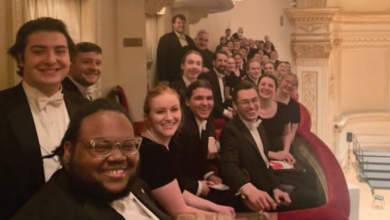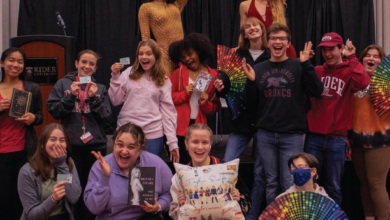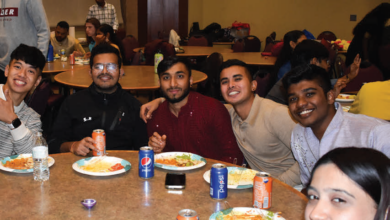
Tips and tricks to virtual teaching from an assistant professor
By Sarah Siock
Just three months into her second semester as an assistant professor at Rider, Joanna Kubik found herself teaching 100 college students virtually, while simultaneously caring for two toddlers whose day care was closed indefinitely.
The coronavirus was the reason for her canceled child care and sudden shift into working from home. Kubik’s daily routine was uprooted as she and her husband, who is also an educator, made their two-bedroom house into a classroom and an at-home office.
Attempting to balance work and tend to her children, who were 1 and 3 years old when the pandemic began, was no easy task. With two kids stuck inside all day, Kubik and her husband, Brandon Marcinkiewicz, suddenly felt overcrowded in their own home.
Finding a routine
“All four of us were at home at the same time, all the time. Our office is our dining room table, which is in our living room, which is also our kitchen. Overall, working at home with the two kids was virtually impossible,” said Kubik, an assistant professor in Rider’s Department of Sociology and Criminology.
As a high school social studies teacher, Marcinkiewicz had to maintain a strict virtual login schedule when his school shifted online while Kubik was able to move her classes to an asynchronous format. Due to their conflicting schedules, the couple needed to find extra space to efficiently complete their workdays. Thankfully, Kubik’s mother-in-law lives minutes from their Clifton, New Jersey, home and allowed them to use her spare bedroom for work.
Once again, Kubik and Marcinkiewicz found themselves with another new daily routine. In an attempt to minimize the number of people in their home, Kubik said they split their time at her mother-in-law’s house. Marcinkiewicz would work at his mother’s house in the morning hours, while Kubik remained home with the children. Around 1 p.m. Marcinkiewicz returned home, and Kubik would leave to spend the rest of the workday at her mother-in-law’s.
While Kubik said having the extra location was helpful, she admitted that finding the time to complete all work tasks was difficult since her children required full-time care. As a result, after the kids went to sleep, the couple still spent time in the evening answering emails and grading papers.
“It really was just awful. We had my mom’s physical house but without that, I do not know how we would be able to work. There was no option of going to a café or a library,” said Kubik.
With two children under the age of 3 spending the entirety of their day at home, Kubik was forced to be creative in finding fun activities to keep them occupied. Kubik said her backyard transformed into a “fun zone” complete with a bounce house and trampoline. Hiking at state parks also became a frequent outing for the family.
Despite the difficult situation, Kubik said the increased family time brought her children closer together.
“They had each other. They got so used to being together all the time. I think it would have been much tougher if I only had one kid, but it was really great for them to have each other,” said Kubik.
Adjusting to virtual teaching
While all teachers struggled to make the unexpected shift to online learning, Kubik’s situation was particularly challenging in that she had worked at Rider for less than a year when the change occurred. Kubik came to the university in September 2019 and just as she began to feel fully adjusted to the new environment, the pandemic closed the university.
“I have been at Rider longer virtually than I have in person. I want to meet with my students, I want to see them more often because I found that there’s such a divide when you’re not seeing them,” said Kubik.
Fortunately, Kubik did not have to face her teaching obstacles alone. Sarah Trocchio, a fellow assistant professor in the sociology and criminology department, came to Rider the same month as Kubik. Both professors were put in a unique situation of teaching online at a new job.
As the only women in their department, with Kubik being 36 years old and Trocchio being 35 years old, the professors quickly found out they had much in common. The two became fast friends by bonding over previously completing doctoral programs at Rutgers University and having children of similar ages. Trocchio said, “We have a lot of overlap in life beyond being parents, but both being moms is a foundation of our friendship.”
Before the pandemic, Trocchio and Kubik would eat lunch together each day to share tips and tricks of adjusting to the new job. Trocchio said she and Kubik were finally starting to “get the lay of the land” and have a familiarity with students and faculty before the pandemic hit.
“It was really hard not to see ‘Dr. K’ regularly once we shifted to online classes. We entered this experience together. Part of what is so meaningful about being a mother that works outside of the home is having this dedicated time to foster and develop additional aspects of your identity without at the same moment having to navigate being a mom,” said Trocchio. “Even though my relationship with ‘Dr. K’ is partially based around motherhood, it’s nice to be able to talk to her about motherhood, while also not mothering.”
While Kubik and Trocchio now have opposite schedules due to their child care situations, every few weeks the professors check in with each other over video chat.
Kubik said, “Having that collegiality with ‘Dr. T’ really helped me get through this professionally. Without her, I would have felt alone as a new person at Rider.”
The new normal
Now, a year later, Kubik’s life is beginning to move into a sense of normality.
Her children have returned to day care and Marcinkiewicz is back to teaching in-person. However, Kubik said the pandemic continues to have effects on her life. She said her marriage has been impacted most significantly by lockdowns and the work-from-home lifestyle.
“Brandon and I are in a much better place now, but COVID is still affecting everyone. We were both working professionals whose routines were flipped upside down. We had marital struggles, we had more fights, we had more stress and more frustrations, but at the same time, we were also trying to cook dinner and raise kids,” said Kubik.
Kubik said her relationship struggles were unexpected, but the pandemic ultimately showed the strength of their five-year marriage.
“I remind us all that we have to figure out how to live together. This is hard, but we are a family. We are learning together to get through this, and if we can get through this, we can get through anything,” said Kubik.



